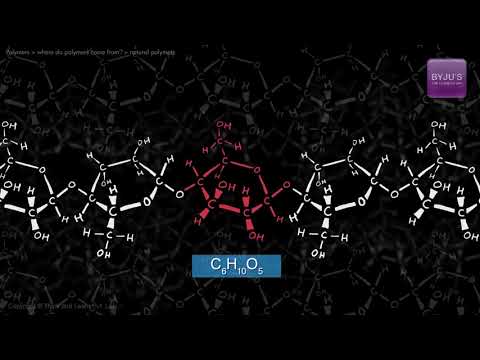What are Natural Polymers?
A polymer is basically synthesized by joining small molecules or substances into a single giant molecule by a chemical process. The small molecules which are used in synthesizing a polymer are called monomers. Natural polymers are those substances which are obtained naturally. These polymers are formed either by the process of addition polymerization or condensation polymerization.
Polymers are extensively found in nature. Our body too is made up of many natural polymers like nucleic acids, proteins, etc. Cellulose is another natural polymer which is a main structural component of plants. Most of the natural polymers are formed from the condensation polymers and this formation from the monomers, water is obtained as a by-product.

Some natural polymers also include DNA and RNA, these polymers are very much important in all the life processes of all living organisms. This messenger RNA is the one that makes possible peptides, proteins, and enzymes in a living body. Enzymes inside the living organisms help the reactions to happen and the peptides make up the structural components of hair, skin, and also the horns of a rhino. The other natural polymers are polysaccharides or called sugar polymers and polypeptides such as keratin, silk, and the hair. Natural rubber is also a natural polymer which is made of hydrogen and carbon.
Examples of Natural Polymers
There are many examples of natural polymers which occur in nature. A brief description of some of them is listed below-
- Proteins and Polypeptides- Proteins are the basic type of natural polymers which constitute almost all living organisms. Proteins are said to be most versatile in nature. They can also be used as catalysts. Some proteins are called enzymes. These enzymes are responsible for various chemical reactions occurring in our body. One type of protein in our blood called haemoglobin carries the oxygen from the lungs to the cells of the human body.
A protein is usually a naturally occurring type of polyamide. This polymer consists of an amide group present in the backbone chain of the human body.
- Collagen– Collagen is one of the natural polymers and is a protein. It makes up the connective tissue present in the skin of human beings. This collagen-polymer is also a fibre that creates an elastic layer below the skin and thus helps in keeping it supple and smooth.
- Latex- Latex is known to be a kind of rubber, and rubber is a natural polymer. This latex occurs in both forms either synthetic or natural. The natural form of latex is mainly collected from the rubber trees and it is also found in a variety of plants including milkweed. It can also be prepared artificially by the process of building up long chains of molecules of styrene.
- Cellulose– Cellulose is one of the most abundant organic compounds found on the Earth and moreover the purest form of natural cellulose is cotton. The paper manufactured from the woods of trees and also the supporting materials in leaves and plants mainly comprise cellulose. Like this amylose, it is also a polymer which is made from the monomers of glucose.
- Starch– Starch is the derivative of condensation polymerization and consists of glucose monomers, which further split into water molecules when combined chemically. Starch is also a member of basic food groups called carbohydrates and it is found in grains, cereal and potatoes. Starch is a polymer of the monosaccharide glucose. The molecules of starch consist of 2 kinds of glucose polymers namely amylopectin and amylose which are the main components of starch in most plants.



Comments